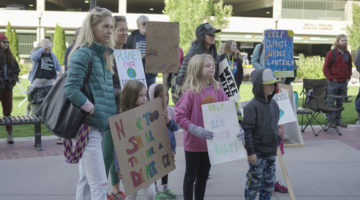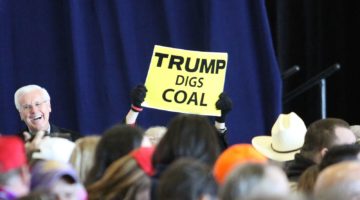
A woman holds a sign protesting climate change nay sayers at the People’s Climate March on April 29, 2017, in Washington, DC. The College of Business hosted the second annual Global Climate Change Summit on Monday, Sept. 23
The second Global Climate Change Summit—an event hosted by the College of Business at the University of Nevada, Reno—is being held Monday, Sept. 23 at the Joe Crowley Student Union.
The event provides students, faculty and the general public an opportunity to network and engage with industry experts and panelists, as well as other summit attendees. The summit features a student poster competition, which gives any Nevada System of Higher Education student the opportunity to present their research and efforts regarding climate change adaptation, mitigation and analysis. Members of the public and faculty are charged a $75 entry fee to the conference, and students of the Nevada System of Higher Education will be charged a $15 entry fee.
The summit was first proposed in 2017 by economics graduate research assistant Angelo Sisante as an event where experts in various fields would collaborate and facilitate a conversation to educate the community about the various avenues for solving the issue of climate change.
The conference is held every two years, allowing time for the College of Business to come up with relevant topics and panels each year. At this year’s summit, there will be three panels dealing with specific topics regarding climate change, both locally and universally.
Panel One will be focused on climate change in Nevada, and will feature research faculty from the University of Nevada, Reno, the University of Nevada, Las Vegas and the Desert Research Institute. They will apply their knowledge of climate change science to examine how it directly impacts Nevada.
Panel Two features representatives of local and state governments in Nevada who will examine what the public sector can do to address climate change. This includes using policies such as regulations or incentive approaches.
Panel Three will feature industry experts and leaders from the private sector from Nevada who will explain the strategies they employ to mitigate climate change impacts on their business models, or adapt to these impacts by adjusting said models.
Frederick A. Steinmann, an assistant research professor at the College of Business who also engages in community outreach, explained the philosophy of why the college chose to put on the event.
“We try to leverage our expertise and our knowledge and our specific disciplines with the knowledge and expertise of individuals in other disciplines to really kind of present a holistic picture, and in this case one focused on climate change,” Steinmann said.
He believes while the Global Climate Change Summit is the college’s focus at the moment, he hopes it can produce some smaller events and forums regarding climate change. He wants to eventually focus on dealing with how issues of the environment can impact local economies.
Steinmann used the example of the college’s 2018 Saving Snow Forum, which examined how declining snowpack levels, specifically this year in the Sierra Nevada mountains. He believes it can impact downstream users which includes farmers in Churchill County, developers in the urban areas of Carson, Reno and Sparks. He hopes to replicate that a little bit after this Climate Change Summit.
Matt Cotter can be reached at tkjohnson@sagebrush.unr.edu or on Twitter @NevadaSagebrush.











